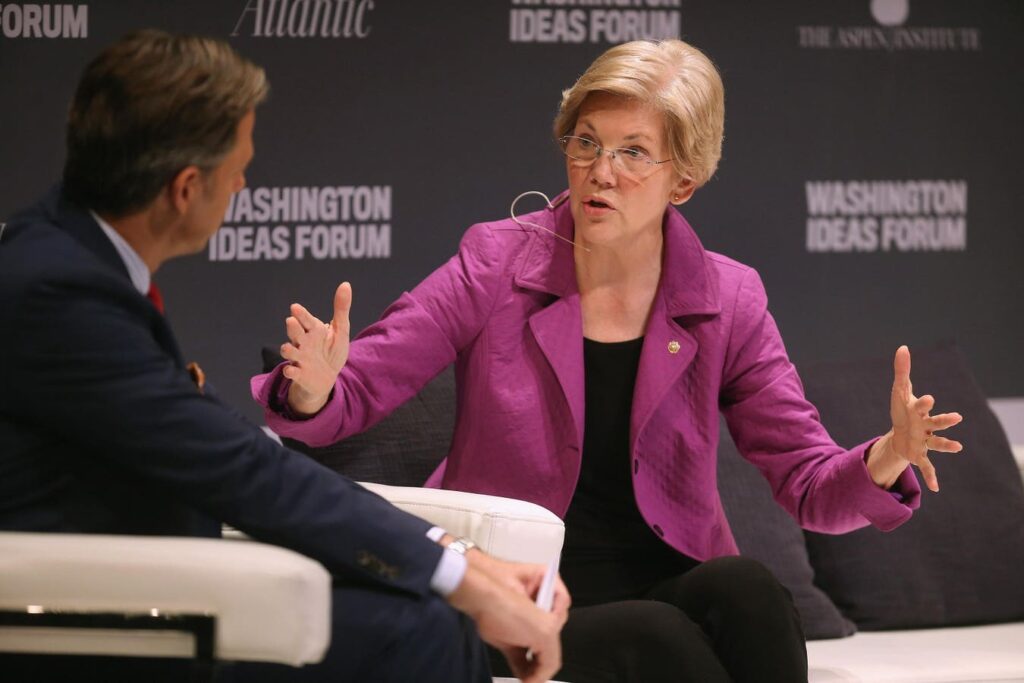Last month, President Donald Trump announced that the U.S. government would take an $8.9 billion dollar stake in the chipmaker Intel. The announcement was unusual, evoking a relationship between state and industry more familiar in communist countries than in recent U.S. history. On Thursday, Senator Elizabeth Warren called on Commerce Secretary Howard Lutnick to ensure that Trump’s announcement doesn’t stick American taxpayers and workers with a raw deal.
“The President is handing billions of dollars of taxpayer money to Intel and asking for nothing in return,” she wrote. “What is the American public getting from this deal? An extremely risky investment.”
The announcement revealed a curious reversal of fortunes for Intel, which just weeks ago found itself battling with the White House after President Trump tweeted that the company’s CEO, Lip-Bu Tan “must resign, immediately,” because he allegedly invested in companies with ties to the Chinese military. After the tweet, Tan visited the White House to meet with Trump and his staff. Later that day, Trump made a social media post praising Tan’s “amazing story,” and less than two weeks later, he announced intent to invest U.S. funds in the company.
The Intel investment is just one in a slew of at-times unclear deals the President has made with executives at institutions and companies across the country since returning to power in January. While Trump has been consistently loud about his “dealmaking” — with law firms, universities, and now private companies — the resulting agreements have often been light on the details, so much that in some cases, they may not amount to real “deals” at all.
Warren, who previously taught contracts at Harvard Law School, demanded granular specifics about the Intel deal, asking Lutnick exactly who negotiated it, under what authority they did so, and how the agreement will affect Intel’s existing obligations to the public. She also asked the department to disclose what specific protections in the deal would insulate taxpayers and workers from greed or mismanagement by Intel executives.
Senator Warren, along with Senator Bernie Sanders, proposed a similar idea in 2022 that would have converted the government’s grants to Intel through President Biden’s CHIPS Act into an equity stake in the company. But their proposal would have required the company to forgo stock buybacks, keep jobs in the U.S., respect collective bargaining agreements and not oppose unionization. Similarly, the Biden grant, she said, “came with a clear deliverable: Intel was to invest over $100 billion in new fabs and facilities across the country.” It doesn’t appear the Trump deal requires Intel to do anything at all, including abide by the CHIPS Act’s conditions.
Warren also argues that Trump’s Intel deal is simply bad economics. “Intel is a failing company,” she wrote, pointing out that the company’s stock fell a staggering 60% last year. Intel itself has acknowledged these challenges — and has suggested that the Trump deal might beget further “adverse effects.” Intel’s primary market for the past two years was China, where the company has faced recent headwinds because of its association with the U.S. government. Direct U.S. investment is near-certain to accelerate Chinese government mandates that local government offices (and potentially state-involved businesses) should discontinue their reliance on Intel tech.
Intel also came under recent fire after Forbes learned that it was advertising partnerships with Chinese firms sanctioned by the U.S. government for human rights abuses.
A longtime opponent of Trump’s, Warren has considerable expertise in both dealmaking and consumer protection. In 2011, she helped create the Consumer Financial Protection Bureau, which Trump’s director of the Office of Management and Budget (a former architect of Project 2025) shuttered earlier this year. Since Trump’s reelection, she has painted his administration as rife with self-dealing and soft on corruption. In the letter to Lutnick, she said that public investments “must be obtained and managed in a transparent and strategic fashion, not the chaotic special interest-favoring approach taken by the President.”
Read the full article here


